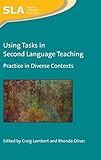Using Tasks in Second Language Teaching : Practice in Diverse Contexts / ed. by Craig Lambert, Rhonda Oliver.
Material type: TextSeries: Second Language Acquisition ; 143Publisher: Bristol ; Blue Ridge Summit : Multilingual Matters, [2020]Copyright date: ©2020Description: 1 online resource (368 p.)Content type:
TextSeries: Second Language Acquisition ; 143Publisher: Bristol ; Blue Ridge Summit : Multilingual Matters, [2020]Copyright date: ©2020Description: 1 online resource (368 p.)Content type: - 9781788929448
- 9781788929455
- 418.0071 23
- P118.2 .U836 2020
- online - DeGruyter
| Item type | Current library | Call number | URL | Status | Notes | Barcode | |
|---|---|---|---|---|---|---|---|
 eBook
eBook
|
Biblioteca "Angelicum" Pont. Univ. S.Tommaso d'Aquino Nuvola online | online - DeGruyter (Browse shelf(Opens below)) | Online access | Not for loan (Accesso limitato) | Accesso per gli utenti autorizzati / Access for authorized users | (dgr)9781788929455 |
Frontmatter -- Contents -- Contributors -- 1 Introduction: Tasks in Context -- Part 1: Issues in Using Tasks -- 2 Frameworks for Using Tasks in Second Language Instruction -- 3 Low-Proficiency Learners and Task-Based Language Teaching -- 4 Some Principles for Interactive Task Design: Observations from an EFL Materials Writer -- 5 Using Technology- Mediated Tasks in Second Language Instruction to Connect Speakers Internationally -- 6 Using Tasks within Neoliberal Educational Environments -- 7 Teacher-Preparation for Task-Based Language Teaching -- Part 2: Approaches to Using Tasks -- 8 A Task-Based Needs Analysis for US Foreign Service Officers: The Challenge of the Japanese Celebration Speech -- 9 Developing Authentic Tasks for the Workplace Using Needs Analysis: A Case Study of Australian Aboriginal Vocational Students -- 10 The Potential Use of Tasks in Post-Soviet Schools: Case Studies from Ukraine -- 11 Task Design and Implementation for Beginning-Level Elementary School Learners in South-Brazil: Challenges and Possibilities -- 12 Teachers’ Responses to an Online Course on Task-Based Language Teaching in Mexico -- Part 3: Research on Using Tasks -- 13 Metacognitive Instruction for Collaborative Interaction: The Process and Product of Self-Regulated Learning in the Chilean EFL Context -- 14 Collaborative L1 Planning and L2 Written Task Performance in an Iranian EFL Context -- 15 Collaborative Writing Tasks in an L3 Classroom: Translanguaging, the Quality of Task Outcomes and Learners’ Perceptions -- 16 The Role of Task-Based Interaction in Perceived Language Learning in a Japanese EFL Classroom -- 17 The Impact of Agency in Pair Formation on the Degree of Participation in Young Learners’ Collaborative Dialogue -- 18 The Accuracy of Teacher Predictions of Student Language Use in Tasks in a Japanese University -- 19 Conclusion: Future Directions for Research on Tasks in Second Language Instruction -- Index
restricted access online access with authorization star
http://purl.org/coar/access_right/c_16ec
This book examines the use of tasks in second language instruction in a variety of international contexts, and addresses the need for a better understanding of how tasks are used in teaching and program-level decision-making. The chapters consider the benefits and challenges that teachers, program designers and researchers face in using tasks.
Mode of access: Internet via World Wide Web.
In English.
Description based on online resource; title from PDF title page (publisher's Web site, viewed 25. Jun 2024)


